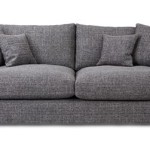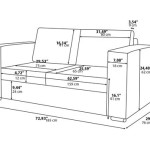Small Living Room Sofa Layout
Maximizing space in a small living room requires careful planning and strategic furniture placement. The sofa, often the largest piece of furniture in the room, plays a crucial role in defining the layout and overall flow. Understanding how to best position a sofa in a limited space can significantly enhance both functionality and aesthetics.
Key Considerations for Small Living Room Sofa Layouts
Several factors influence the ideal sofa placement in a compact living room. These include the room's shape, the location of windows and doors, and the presence of other furniture pieces. Analyzing these elements helps determine the most effective layout.
Against the Longest Wall
Positioning the sofa against the longest wall is a common and often effective strategy in small living rooms. This placement maximizes floor space and creates a sense of balance. It allows for easy traffic flow and provides a clear focal point within the room.
In the Corner: L-Shaped Sofas
L-shaped sofas can be particularly useful in small living rooms, especially when placed in a corner. They offer ample seating while utilizing corner space effectively. This configuration can also help define distinct areas within an open-plan living space.
Floating the Sofa: Creating Zones
Positioning the sofa away from the walls, also known as "floating" the sofa, can be a surprisingly effective tactic in small living rooms. This layout creates a sense of intimacy and can help define separate zones, particularly in combined living and dining areas. However, it requires sufficient space for circulation around the sofa.
Utilizing Vertical Space
In compact living areas, utilizing vertical space becomes crucial. Incorporating tall bookshelves or wall-mounted storage units above and around the sofa can maximize storage capacity without encroaching on valuable floor space. This also contributes to a visually appealing and organized environment.
Choosing the Right Sofa Size and Style
The sofa's physical dimensions and style significantly impact the layout of a small living room. Opting for a smaller-scale sofa, such as a loveseat or apartment-sized sofa, can free up considerable floor space. A sofa with a streamlined design and raised legs can also create an illusion of spaciousness. Avoid bulky or oversized sofas that can overwhelm the room.
Creating Balance with Other Furniture
The placement of other furniture pieces in relation to the sofa is essential for achieving a balanced and functional layout. Consider using smaller-scale chairs, ottomans, or nesting tables to complement the sofa without cluttering the space. Strategic placement can enhance conversation areas and improve traffic flow.
Multi-Functional Furniture
Selecting furniture with multiple functionalities can be advantageous in a small living room. A sofa bed, for instance, provides additional sleeping accommodations for guests. Storage ottomans offer seating and hidden storage, reducing clutter and maximizing space utilization. These adaptable pieces contribute significantly to functionality without compromising aesthetics.
Consider Traffic Flow
Planning for easy movement within the room is critical when arranging furniture in a small living space. Ensure sufficient space between the sofa and other furniture pieces to allow comfortable passage. Avoid obstructing doorways or creating bottlenecks that hinder natural traffic flow. A well-considered traffic pattern contributes to a more functional and comfortable living environment.
Embrace Natural Light
Natural light can make a small living room feel larger and more inviting. Avoid blocking windows with large furniture pieces like the sofa. Position the sofa in a way that maximizes natural light penetration. This can create a brighter and more spacious atmosphere.
Rugs to Define Space
Using rugs can help define distinct areas within a small living room. Placing a rug under the sofa and accompanying furniture creates a cohesive and visually appealing grouping. The rug's size and placement contribute significantly to the overall sense of balance and organization within the room.
Mirror Placement to Enhance Space
Strategically placed mirrors can create an illusion of depth and spaciousness in a small living room. Positioning a large mirror opposite a window or on a wall perpendicular to the sofa can reflect light and visually expand the room. This technique enhances the perceived size of the space without requiring physical expansion.
Minimalist Approach
Adopting a minimalist approach to furniture and décor can significantly enhance the sense of space in a small living room. Keeping the number of furniture pieces to a minimum and selecting items with clean lines and simple designs prevents the room from feeling cluttered. This approach emphasizes functionality and creates a more open and airy environment.
Accentuate with Light Colors
Lighter color palettes for walls, furniture, and décor can visually expand a small living room. Light colors reflect more light, making the space feel brighter and more open. Consider using neutral tones, pastels, or cool shades to create a sense of airiness and enhance the perception of spaciousness.

Pin On Home Design
:strip_icc()/cdn.cliqueinc.com__cache__posts__198376__best-laid-plans-3-airy-layout-plans-for-tiny-living-rooms-1844424-1469133480.700x0c-825ef7aaa32642a1832188f59d46c079.jpg?strip=all)
How To Arrange Your Living Room Layout No Matter The Size

How To Arrange Furniture In A Small Living Room Setting For Four Interiors

How To Perfect Your Living Room Furniture Layout

50 Living Room Layout Ideas How To Arrange Seating

How To Efficiently Arrange The Furniture In A Small Living Room

Small Living Room Layout Ideas

How To Efficiently Arrange The Furniture In A Small Living Room

A Guide To Planning Living Room Layouts Design Cafe

Beautiful House Interior Design Ideas Rectangular Living Rooms Room Furniture Layout Small








